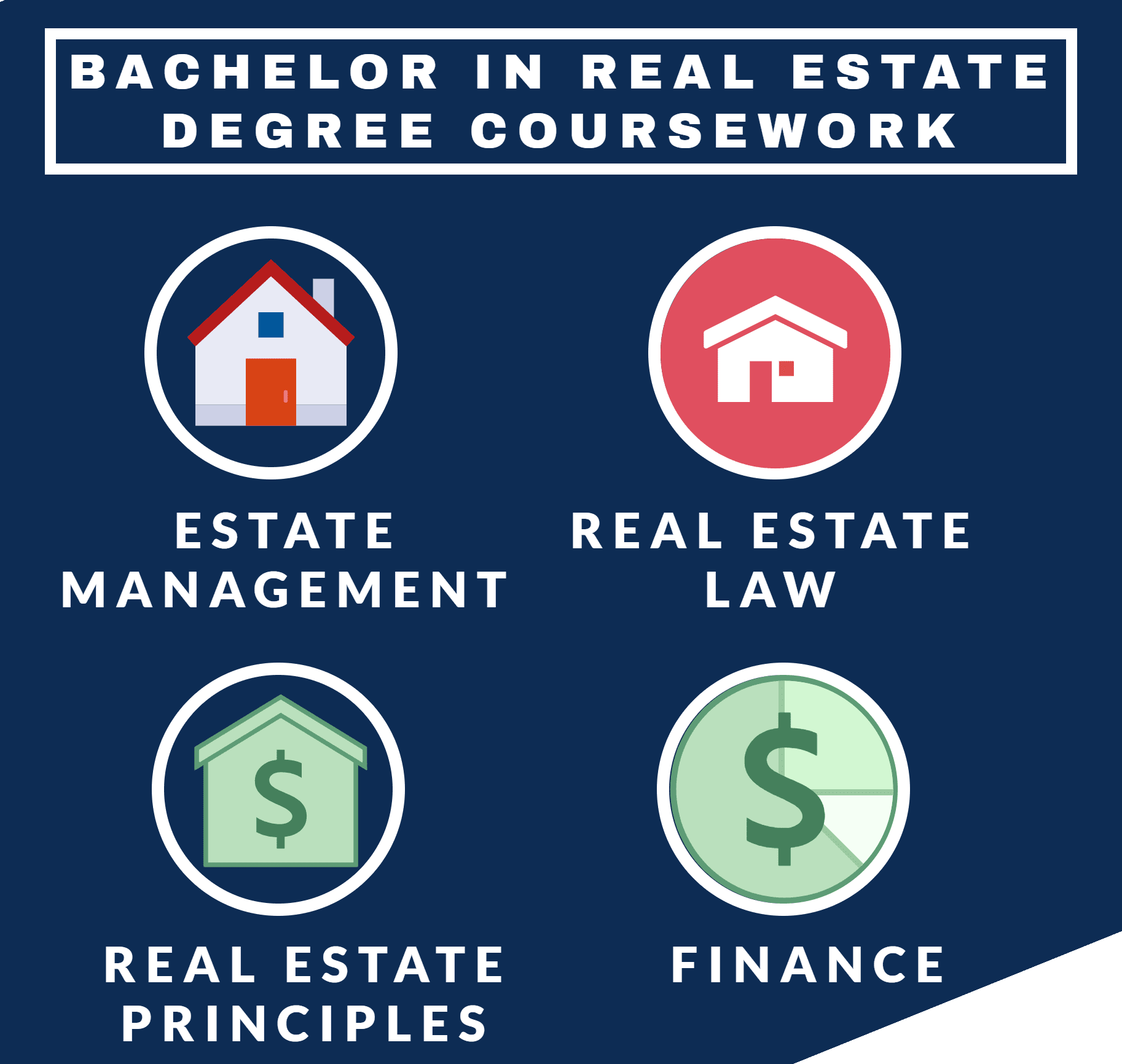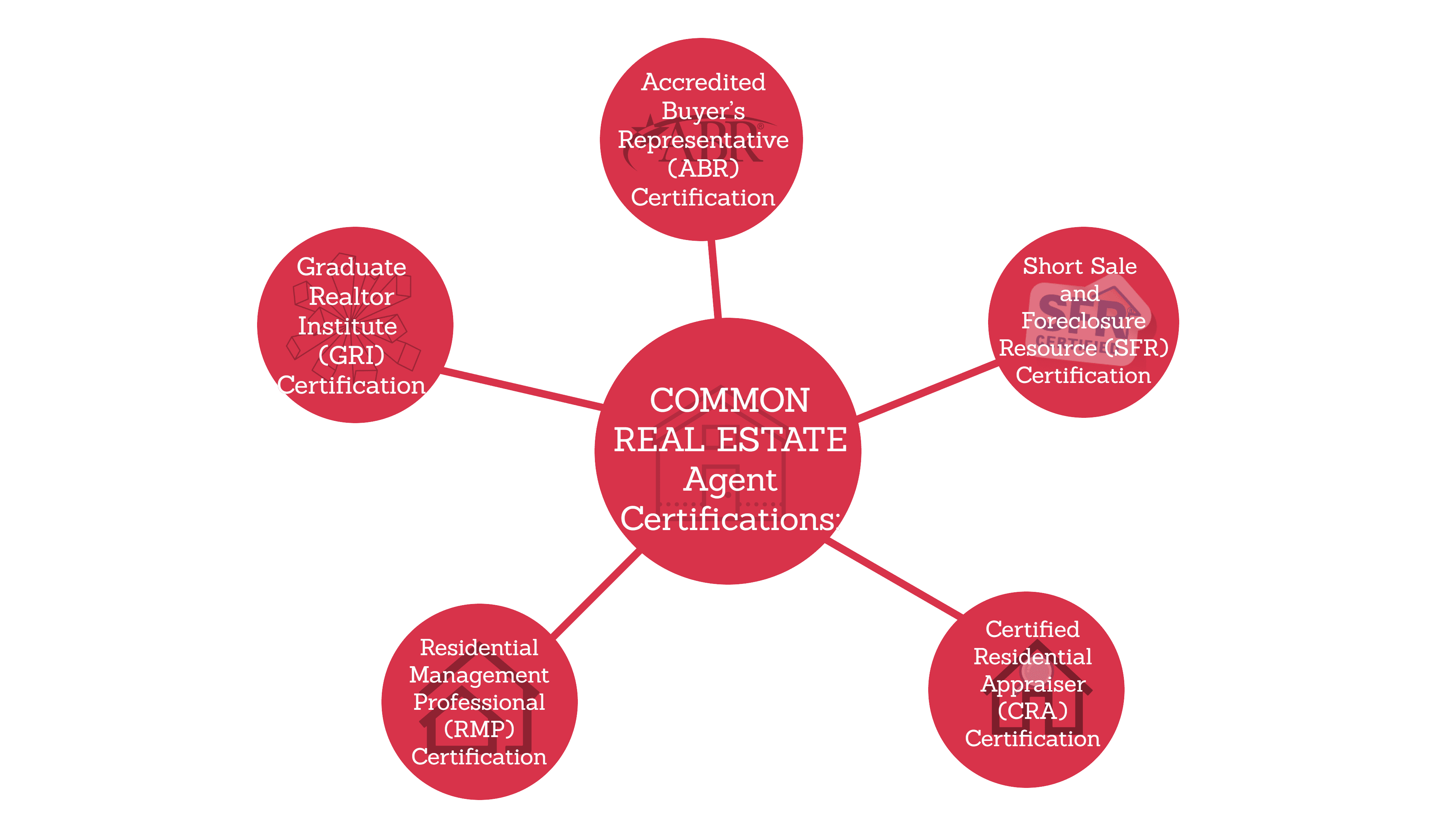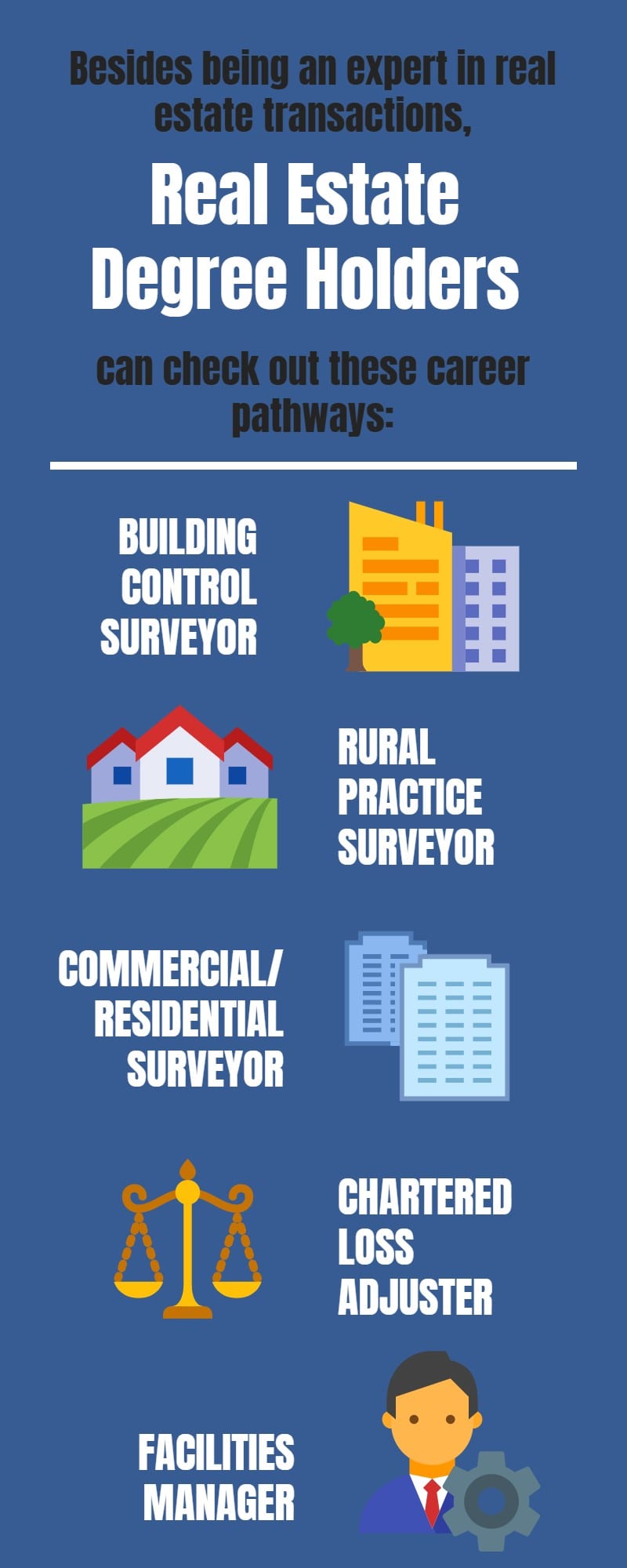Anyone dealing with real estate as a professional will tell you that it’s a blend of business, finance, and marketing principles. Plus, it’s a lucrative business with lots of potential, especially in the U.S. market. Students who aspire to become professional appraisers, real estate brokers, or property manager can earn their real estate degrees without sacrificing current commitments.

Thankfully, accredited online schools have taken notice and offer real estate courses through an online platform.
Page Jumps!
METHODOLOGY
Online real estate degree allows students from anywhere in the globe to gain access to becoming a legitimate broker or appraiser in their spare time. For distance learners and working individuals, taking an online degree in real estate could help you save time and resources, and still reach your goals. Here are the best online schools that were selected based on important factors:
- Online schools promote high educational standards through the rigorous coursework that traditional learning offers.
- Future real estate professionals learn from industry experts as their online instructors. The online degree program curriculum features up-to-date training to equip students for rewarding careers in the field.
- Online real estate degree students access their coursework on exceptional virtual learning platforms that promote conducive online learning environments. These platforms may also feature technical support that immediately addresses the issues that affect the distance learner’s access to the coursework.
- This list features the top-rated online schools that are recognized by accrediting bodies. Their undergraduate Real Estate programs may have also received accreditation.
Check out our Methodology page!
Best Online Schools for Bachelor’s in Real Estate

University of Memphis

Online Bachelor of Business Administration-Real Estate
Under the Department of Finance, UofM’s Bachelor of Business Administration with a concentration in Real Estate provides a glimpse for students looking for opportunities in the property market. Under this program, you will encounter topics on:
- finance,
- real estate principles,
- investments,
- law,
- and appraisal.
This 120-credit course provides a viable framework for students looking to become professional real estate agents, appraisers, or property managers. Financial aid such as FAFSA is also available for U.S. citizens.
Learn more about UofM’s online Bachelor of Business Administration-Real Estate program.
Clarion University of Pennsylvania

Online Bachelor of Science in Business Administration in Real Estate
The online Bachelor of Science in Business Administration in Real Estate is intended to prepare students planning to become professional real estate agents and property managers. You will encounter topics on:
- investment analysis,
- valuation,
- financial analysis,
- and real estate management, to name a few.
Scholarships are also available for qualified students. This program prepares students for the Pennsylvania licensure exams under salespersons and real estate brokers. If you’re considering taking legal business, this institution offers this course as an on-campus program.
Learn more about the online Bachelor of Science in Business Administration in Real Estate program.
University of Florida (UF Online)

Online Bachelor of Arts/Bachelor of Science in Business Administration-General Studies
Through the UF Online platform, students taking the Bachelor of Arts or Bachelor of Science in Business Administration specializing in General Studies will be equipped to understand the dynamics and fundamentals of real estate trade.
As part of the program, internships for students taking the course from abroad can be waived. However, if you’re planning to pursue a senior position or graduate school, you are encouraged to take an internship program from an accredited institution.
Learn more about UF Online’s Bachelor of Arts or Bachelor of Science in Business Administration-General Studies program.
Mississippi College

Online Bachelor of Business Administration (with Real Estate Law Elective)
Students pursuing a career in the real estate industry might be interested in participating in MC Online’s Bachelor of Business Administration. Electives in real estate include Real Estate Law and Monetary Economics as some of you might encounter when you enroll in this program. Students who apply for credit transfers are subject to eligibility.
Learn more about MC’s online Bachelor of Business Administration (with Real Estate Law Elective) program.
Florida International University

Online Bachelor of Business Administration in Real Estate
FIU Online offers a Bachelor of Business Administration in Real Estate as one of their online programs suited for working adults and distant learners. This degree will help you understand both business and real estate principles such as:
- financial markets,
- market trends,
- financial analysis,
- economics,
- and legalities involving this industry.
This 120-credit curriculum also covers global real estate topics that will give you an edge in analyzing global markets.
Learn more about FlU Online’s Bachelor of Business Administration in Real Estate program.
Purdue University Global

Online Bachelor of Business Administration-Real Estate
The online Bachelor of Business Administration with a concentration in Real Estate will help you understand local economies, market trends, and global business. Students who’d like to pursue a professional career in real estate will be able to:
- combine the principles of marketing,
- apply critical thinking in handling business negotiations,
- and do consultations for clients and corporations in purchasing properties for personal or investment purposes.
This may also serve as a jumping board for students who would want to pursue a graduate degree in business as well.
Learn more about Purdue University Global’s online Bachelor of Business Administration-Real Estate program.
Middle Tennessee State University (MTSU)

Online Bachelor of Business Administration-Finance (with Real Estate Concentration)
Under Bachelor of Business Administration major in Finance with a concentration in Real Estate, this is a specialized concentration dealing with the principles and technical aspects of the trade.
Specially catered to small business owners, this program will help aspiring entrepreneurs, managers, and sales representatives apply basic and functional principles of finance to real-world applications in the real estate spectrum.
Qualified students may also be awarded scholarships and possible hands-on experience in urban rehabilitation.
Learn more about MTSU’s online Bachelor of Business Administration-Finance (with Real Estate Concentration) program.
Frequently Asked Questions

What is the coursework for a Bachelor’s degree in real estate?
Choosing a real estate program will depend on your goals. Some students may prefer to take on a major in Finance or Business Administration with a concentration in Real Estate. For some, taking a full-time undergraduate degree dedicated to this niche is the best way. Your preference will depend on your academic stance, as well.
For students with a previous degree, taking a second degree fully dedicated to real estate may provide them an edge against others. For those without prior degrees but who would want to learn more about real estate, going for a concentration may work best.
You must accomplished all the requirements before enrolment. Some schools require that you have at least a high school diploma or GED if you’re entering as a new student. Some schools will require a minimum GPA score of 2.0 with 18 to 30 credit hours of prior learning experience.
Students with previous learning credits may want to apply for an accelerated learning program to cut down the learning period. Veterans and military personnel may benefit from educational benefits such as the GI Bill and Yellow Ribbon programs in selected institutions.

You will need to set schedules dedicated to learning. Considering the time required to finish this degree. It will require persistence and commitment on your end if you want to earn it.
If you’re already considering taking a real estate program part-time or full-time, here are some typical coursework you might encounter.
Real Estate Principles
This is a critical topic covering the disciplines of real estate properties, jargon, and management. This class will help you accomplish all the requirements you will need to meet before going for state licensure.
Real Estate Law
This course will introduce you to the legalities involved with real estate transactions. It covers contracts, regulations, and wills. You will also touch on topics such as ownership, inheritance laws, property investment, and purchase sales under this course.
Appraisal
This course is essential for those planning to become assessors. It focuses on techniques you’ll need as an appraiser. Usually, there are two sections to this class: residential and investment property. You will also get to learn the market value of features, including the political, social, and economic impact.
Finance
Be ready to do some number-crunching. You will be taught to assess and evaluate investments in terms of mortgages, loans, purchase costs, valuing a property, and foreclosure.
Estate Management

This is considered a capstone course for most real estate programs. You will be taught about property management covering topics on marketing, property maintenance, and community management. You may encounter other issues that require the critical skill of decision-making to expertly handle real estate transactions.
Most real estate degrees have 120-credit hour coursework that could be accomplished within two to four years, but completion time generally depends on the type of degree you are pursuing. If you choose an accelerated program, you will take the courses in five- or eight-week intervals throughout the year. General education courses are usually credited with 60 hours while the remaining is credited for electives and major curricula.
What other licenses or certifications will I need to become a real estate professional?
After passing the courses, you will become a real estate professional. But it doesn’t stop there.
Real estate agents, brokers, appraisers, and property managers need to be licensed to practice their profession. Though licensing requirements differ from state to state, here are the basic prerequisites:
- At least 18 years old (age limit varies with the state)
- Must be residing in the U.S and a U.S citizen
Pre-license education such as an associate’s degree or undergraduate degree (but some states will only require specific training and certifications)

During the pre-licensing phase, you are required to take a particular course as part of the certification process. Schools that provide these pre-licensing courses should be accredited and meet all requirements mandated by law. A post-course exam may be required to validate whether or not you will proceed with the licensure exam. Look into government websites to verify whether your preferred school is accredited to give a pre-licensing course.
Once you’ve passed the real estate licensure exam, a post-licensing exam may be required. This exam is a requirement for your first license renewal. You will encounter a class or series of classes to help you move forward from probationary or provisional to a fully licensed real estate professional.
As part of the continuing education requirement, you will be required to attend and learn through numerous accredited courses. These short courses need to be accomplished within a specified period where you earn credits to continue practicing your profession. The requirement for hours and credits will vary from state to state.
For real estate agents, certifications may include the following:

- A Graduate Realtor Institute (GRI) certification shows you’ve attained a certain level of specialization. This usually takes 60 to 90 hours to deal with laws and regulations, technology, and deeper insights into the sales process.
- Accredited Buyer’s Representative (ABR) is another certification for agents who sell at least five residential properties as a representative to the buyer. The courses for ABR certifications are usually given online and can be accomplished within 36 months.
- Short Sale and Foreclosure Resource (SFR) is a certification to help you evaluate short sales and foreclosures. Considered a tricky trade, the SFR certification is a nine-hour training to help you qualify sellers for this type of transaction, create a short sale package, learn negotiating skills, and mitigate risks between you and the buyer.
- A Residential Management Professional (RMP) certification works almost similarly to that of a CMP (Certified Property Manager). As a pre-requisite, you need to have at least 100 units managed for the last two years along with your real estate broker license.
- A Certified Residential Appraiser (CRA) certification allows you to appraise a maximum of four properties regardless of value or complexity. It usually requires an undergraduate degree with 200 credit hours taken with other supplementary courses. You are to undergo an AQB-approved examination along with completed hours in education and experience to be certified.
What can I do with my Bachelor’s degree in real estate?

As a real estate professional, you are not limited to selling and buying properties alone. Here are some careers to look into after getting licensed and certified.
Building Control Surveyor
A building control surveyor’s task is to ensure that regulations are implemented throughout the project. However, for complex projects, you will participate during the pre-application stage where you provide insights on minimizing delays and risk reduction.
A broad understanding of the law and some background in accounting or finance will be an advantage for this job.
Rural Practice Surveyor
If you prefer to get away from the hustle and bustle of the city, a rural practice surveyor may be the right choice. Your task is to evaluate rural and agricultural properties which may include managing estate staff, finding other uses for the property assessed, providing consultations as to grants, farming subsidiaries, and environmental implications, and advising on developing landscapes to name a few.
This job requires a certain level of expertise in law, land and estate management, and economics.
Commercial/Residential Surveyor
A surveyor looks into the management, leasing of land or property, valuation, and surveying of residential and commercial properties. You carry three roles for this job: auctioneer, agent, and broker. Some surveyors do negotiations between tenants and landlords as well. There will be instances where you’ll also be asked to manage property portfolios if you specialize in investments. On average, this job will earn you around $61,600 per year.
Chartered Loss Adjuster
This job is suitable for assertive individuals with a background in finance. A chartered loss adjuster is someone who resolves issues on insurance claims. You will determine whether or not an insurance policy covers the property involved. Administrative tasks such as writing detailed reports are expected to validate claims or provide recommendations.
You can choose from these six niches:
- property (buildings and their contents),
- business interruption (interruptions in the business and financial risk),
- liability (indemnity claims),
- claimant (advice and assist policyholder),
- subsidence,
- and fraud investigation.
Facilities Manager
A facilities manager handles multiple tasks such as overseeing the safety of the environment for employees, implementing best practices, and planning day-to-day operations throughout the project.
You will also be handling the coordination of contractors, efficient use of monetary resources that maximize returns and minimize losses, strategizing future objectives for the business, and managing contractors to ensure the project is accomplished according to schedule. This job may be suitable for dual holders in engineering or other construction-related degrees.
Other companies will require relevant work experience to qualify for the job. There are possible opportunities in voluntary work for environmental conservation projects if you are still starting.
Numerous employment opportunities are available for real estate professionals. Here are typical employers you’ll likely encounter:
 Global property firms vested in surveying buildings, development, and investment
Global property firms vested in surveying buildings, development, and investment- Medium-sized enterprises and consultancies
- Housing associations
- Smaller firms for rural development
Graduates often pursue postgraduate courses to enhance their skills and knowledge. A program related to finance, banking, or accounting may be ideal. Vocational training such as landscape architecture or taking a short course in law may also boost your opportunity for landing senior positions.

 Global property firms vested in surveying buildings, development, and investment
Global property firms vested in surveying buildings, development, and investment